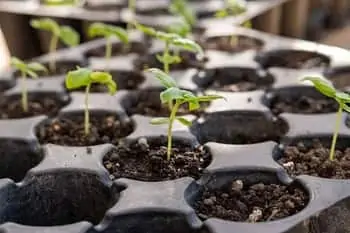Table of Contents
How To Grow Plants from Seeds: A Complete Guide!
You can easily get plants from your local garden center. But growing plants from seeds for yourself is really next-level enjoyment, isn’t it?
In this article, I’m going to give you a complete guide on how to grow plants from seeds. So without further ado, let’s get started!
Here’s how you can grow plants from seeds:
#1. Select The Right Seeds of The Plant
First, you need to have the seeds of the plant you need to grow. (Yes, it might sound obvious but selecting the right plant seed can be crucial.)
If your seed is of bad quality, then wherever you try to grow it, you won’t get the best result!
And there’s no substitute for this thing. So seed selection is very important.
Now the question comes from where to get the seeds? The first and the easiest option is to look at your kitchen. (Yes!)
You can collect seeds from the vegetables that you have in your kitchen. Just you have to make sure that the vegetable you have selected is of a bigger size and it is not fresh.
It must be a rotten (matured) vegetable from which you want to collect your seed. This is because the seeds of the rotten vegetable are generally mature and so another plant can grow from that seed.
Another option you have to collect good quality seed is to check in your local nurseries. Always check the packet of seeds properly and try to get the newest seeds.
If your seeds are not available in the local nurseries then you also look for them online.
#2. Select the Container to Sow the Seeds

Choose the container of your choice. It can simply be a pot or flat tray. As a general rule, the container should have at least 2-3” of depth and some drainage holes.
If you like to DIY, then you can make your own container from yogurt cups, milk cartons, etc. But I would generally recommend using the trays that are made especially for growing the seeds.
Do keep in mind that once your seed germinates and the seedling grows into a considerable size you may need to change the container if you have chosen a small container initially.
So, try to select an adequate size container for growing your seeds. You can even clean and rinse it properly before adding any substrate or seeds to it.
#3. Select The Right Growing Media
You might wonder why to think about growing media! Let’s just grab the seeds and put them in any soil and hope for the best results.
But actually, that’s not the case. The soil or the substrate you are going to use to plant the seeds is very important.
If you don’t select the right substrate, then it would be a complete waste of time. Your seeds won’t be able to germinate properly.
According to the University of Maryland, a growing media has three main functions
- Providing nutrients, air, and water to the roots
- Allow the best growth
- Support the plant physically
Purchase the seed starting soil from your local nursery or make your own mix.
Generally, the mix contains some proportion of gardening soil, vermiculite, and peat. And in that ideal mixture add your seeds.
#4. Start Planting Your Seeds the Right Way
Check for instructions in your seed packets to see how deep you should plant your seed.
If your seeds are small then they can be just sprinkled on the soil surface. However, if the seeds are larger then they might have to be buried a little deeper.
After you have buried your seed in the soil you can cover the top surface of it with some more soil.
You can also place the seeds in the soil with some adequate spacing. This will ensure that they can get enough room to grow.
Also, this would be easy for you in case you would need to shift them to another pot or somewhere else.
You can watch this video on how to sow and grow plants from seeds:
#5. Maintain Proper Temperature
The seeds will grow only when they get the right and proper temperature.
As per natria.com, most seeds will germinate at around 78°F. You can use waterproofing heating mats which are designed specifically to germinate the seeds.
#6. Add Water to Your Soil
You need to water wisely to your soil. You should only give water enough to lightly moisten the soil.
You can spray the water. Don’t use any mug, glass, or pipe to forcefully water the soil because it will disturb the whole seed setup.
As a general rule, whenever you see the top layer drying too much you can spray water. Don’t let the soil dry out completely. You need to keep it moist.
This is because if the seeds get dried completely then they won’t germinate.
And NEVER over water!
Overwatering can cause root rot and even prevent germination of the seeds.
After doing all these a big questions comes to our mind, when will the seeds germinate, right? So let’s discuss that!
How Long Does It Take for A Seed to Grow Into A Plant?
In general, it takes 1-2 weeks for a seed to germinate. In simple words, germination is the development of a plant from seed after a period of dormancy. Usually, warmer environments promote faster seed germination.
Seeds can germinate anywhere from 2 days, 5 days, and even 10 days. So as a general rule of thumb you should wait at least 1-2 weeks for the seeds to germinate.
However, if the seeds aren’t germinating within the time frame I mentioned and are taking quite a long time. Then sadly, the chances of germination can be very less.
There can be some problems in the procedure followed to germinate the seeds. So make sure to follow all the things step by step.
Also, the seed quality and the ideal temperature should be considered.
Now there’s also another question that can come to your mind. Although that is not a big factor still it is good to know the answer to it
Where To Place the Container Containing Seeds You Have Sown?
You might think about where to keep the container or pot in which you have sown your seeds. Should it be kept under sunshine or shade?
Generally, light isn’t strictly necessary for germination in most plants.
For example, when we make chickpeas sprouts at home, we just tie them in a cloth and keep them aside in one corner of our house.
So, do we keep them in sunlight? No!
However, if you have kept your seed container in the sunlight, will it germinate? Yes, they will! Seeds will germinate, even in that condition provided you take some extra care.
If you kept your pot outside in the sun like on your balcony then your topsoil would dry out more frequently.
So as a result, you would have to spray water more frequently.
And if by chance your soil gets too hot, then it may damage the seeds.
Although it depends on your location. If you stay in a very hot climate area then only it might be a concern for you.
And in that case, you can just cover or give some kind of shade to your seeds to protect them from the harsh sunlight.
Generally, it is best to keep the seed container in a shaded area till it germinates. Then you can keep it under the sunlight as per the requirement of that plant species.
Some seeds germinate very well in absolute darkness while some seeds do well in continuous sunlight.
Do note that light becomes a very important thing once the seeds germinate. The initial sprout will not survive if it can’t reach the light source.
Conclusion
So, I hope now you know all the processes of growing a plant from a seed. Follow all the steps I discussed with you in the article and keep some patience to see the best results.
Recent Posts
Have you found yourself wondering, 'why is my bamboo growing so slow?' Despite the fact that bamboo plants are remarkably fast-growing, it can sometimes take months (or even years!) to see any signs...
Miracle-Gro is a huge help when you are trying to get decent yields out of your plants or if you want them to thrive. However, you may have noticed that a single dose of fertilizer does little to...
